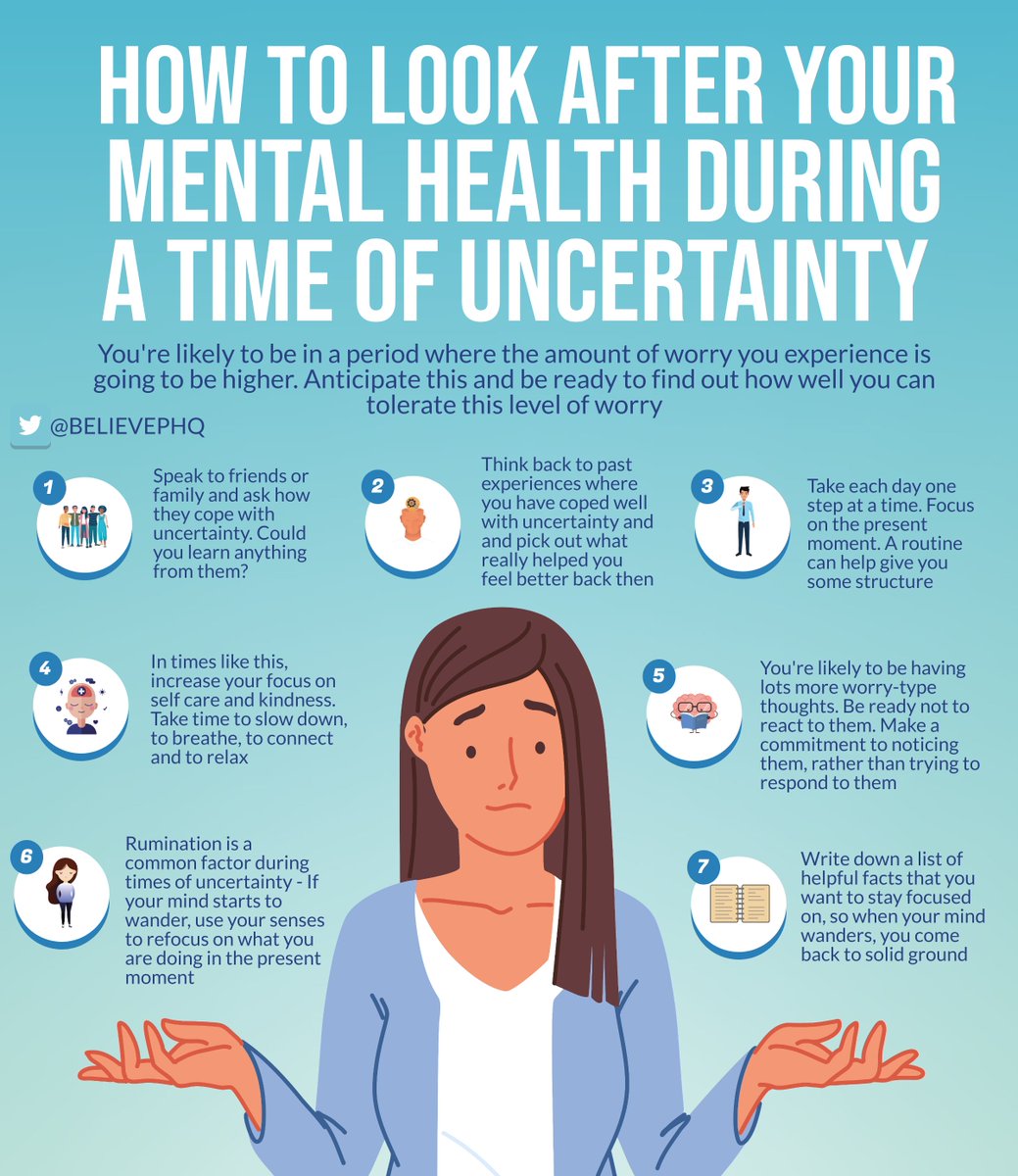Infectious disease outbreaks, like the current coronavirus (COVID-19), can be scary and can affect our mental health. While it is important to stay informed, there are also many things we can do to support and manage our wellbeing during such times.
Here are some tips we hope will help you, your friends and your family to look after your mental health at a time when there is much discussion of potential threats to our physical health.

_______________________________________________________
Student Minds have created a new website called Student Space - Making it easier for Students to find support during Coronavirus. You will have access to wellbeing resources, advice and support! Below are some useful links:
Managing uncertainty during COVID - Webinar
Student Story: Learning online
Self-Isolating as a student
Feel more confident about online learning
Thinking about the uncertainty of the academic year during the pandemic
Making friends during the coronavirus pandemic
Student Story: Communicating online
Student Story: Digital Wellbeing
Feeling lonely
Improve your sleep
Student Space provides free confidential support by phone, text, email and webchat. Whatever is causing you concern, they are there to listen. Whether it's your mental health and you are experiencing suicidal thoughts, anxiety, depression or loneliness or if you are worried about money related issues, relationship breakdowns or anything else in between they can support you and help you move forward.
Call free: 0808 189 5263
Text: To start a conversation text 'STUDENT' to 85258
Email: students@themix.org.uk
Webchat support click here
_______________________________________________________
1. Disconnect yourself from social media
For some, constant news articles and media coverage can be overwhelming and panic inducing. Put your devices away, limit your news feed and allow structured times to read the news. It’s important to stay informed – but it’s okay to take a step back to focus on your wellbeing.
2. Be creative!
Focus on your inner creativity and express yourself through something creative. Paint, draw, write a poem or learn to cook a new recipe. Having more time indoors means having more time to learn new skills. Try looking for online courses and indulging in new activities
3. Stay connected during social distancing
Social distancing can lead to feelings of loneliness and not having a community around us can lead to us feeling socially isolated. It’s important that despite socially distancing ourselves, we don’t cut ourselves off from others. Plan a digital catch up – whether it’s Facetiming your friends, creating family WhatsApp groups to keep in touch, or having Skype meetings with your colleagues. Remind yourself and others that you are not alone.
4. Indulge in nature
Getting outdoors and breathing in some fresh air is amazing for our emotional wellbeing and mental health. Open a window, sit in the garden or pot some herbs. Do something than connects you with nature and our outside world.
5. Maintain your productivity
For those who usually lead a very busy lifestyle and are used to a routine, being self-isolated can lead to them feeling unproductive, bored or unsatisfied. Despite being at home – you can still create a structure for your days. Set daily goals, write to do lists or complete chores you haven’t yet got round to. For anybody working from home – create a workspace that makes you feel motivated, which is separate from your living area.
6. Breathe
During a time where many of us may feel anxious or worried – try finding ways to stay calm and prevent panic. Find a relaxing and comfortable spot to engage in breathing techniques and practice mindfulness. Try using apps such as Headspace where you can engage in guided meditation.
7. Do something physical
As we are being encouraged to avoid public spaces like gyms or sporting events, many of us may feel the mental impact of reducing our physical activity. However, you can still remain physical go on a walk or a run, if you are unable to leave the house why not try jogging on the spot, exercise using online work out videos or play your favourite songs and dance vigorously around your front room. Anything that may keep you active.
8. Do something kind
Being self-isolated can be a lonely and difficult time for many of us. Although it’s important to take care of ourselves – it’s also important to take care of those around us. Perhaps you could ask your neighbours if they need any essentials grabbing from the shops or pharmacy. Write positive notes or postcards to your local care home to help brighten up the resident’s day. Create care packages for your local homeless shelter filled with essentials they may not have. After all, we are all in this together and we are not alone.
_______________________________________________________
